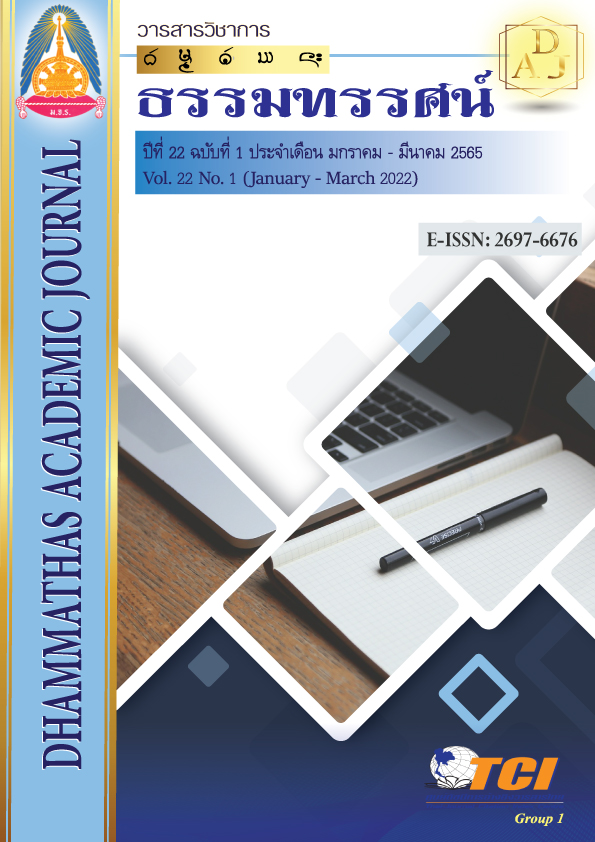Development of Paradigm and Leadership of Modern Leaders of Mahamakut Buddhist University
Main Article Content
Abstract
This research aims 1) to analyze roles and factors affecting the capacity of the administrators of Mahamakut Buddhist University, 2) to develop courses to upgrade the paradigm and capacity of the new leaders and 3) to develop the paradigm and capacity of the new leaders. The research tools used in this study consisted: the training syllabus on developing paradigm and capacity. Statistics used for data analyzing in this study were frequency, percentage, means, average and standard deviation, hypothesis tested with t-test, Descriptive Analysis, Chi-Square Test and Forecasting Equation. The sample group used in the study consisted of 208 staff and temporary workers, in second semester of academic year 2020 from all campuses of Mahamakut Buddhist University. The targeted group of this course for developing paradigm and capacity consisted of 52 administrators including directors of all 3 campuses.
The research result was found:
1. The capacity of the leaders of Mahamakut Buddhist University was overall found at high level. The opinion on roles of the leaders in new paradigm was at high level overall, when on aspects was found strategy placement at the high, followed by use of power on others while the lowest fall on vision perceiving respectively.
2. The result of course assessment was found overall at good level; when considered in aspects, suitability fall at the highest, followed by utilization while the lowest aspect fall on accuracy, respectively.
3. The result of paradigm and capacity development of the new leaders of Mahamakut Buddhist University was found higher than before attending training activities statistically significant at .01.
Article Details

This work is licensed under a Creative Commons Attribution-NonCommercial-NoDerivatives 4.0 International License.
เพื่อให้เป็นไปตามกฎหมายลิขสิทธิ์ ผู้นิพนธ์ทุกท่านต้องลงลายมือชื่อในแบบฟอร์มใบมอบลิขสิทธิ์บทความ ให้แก่วารสารฯ พร้อมกับบทความต้นฉบับที่ได้แก้ไขครั้งสุดท้าย นอกจากนี้ ผู้นิพนธ์ทุกท่านต้องยืนยันว่าบทความ ต้นฉบับที่ส่งมาตีพิมพ์นั้น ได้ส่งมาตีพิมพ์เฉพาะในวารสาร วิชาการธรรม ทรรศน์ เพียงแห่งเดียวเท่านั้น หากมีการใช้ ภาพหรือตารางของผู้นิพนธ์อื่นที่ปรากฏในสิ่งตีพิมพ์อื่นมาแล้ว ผู้นิพนธ์ต้องขออนุญาตเจ้าของลิขสิทธิ์ก่อน พร้อมทั้ง แสดงหนังสือที่ได้รับการยินยอมต่อบรรณาธิการ ก่อนที่บทความจะได้รับการตีพิมพ์References
ดิเรก ดีประเสริฐ. (2549). แนวทางการพัฒนาหน่วยงานทางด้านความมั่นคงในพื้นที่จังหวัดชายแดนภาคใต้. กรุงเทพฯ: กระทรวงกลาโหม.
นุชนรา รัตนะศิระประภา. (2557). สมรรถนะของผู้บริหารที่ส่งผลต่อคุณลักษณะโรงเรียน มาตรฐานสากล สังกัดสำนักงานคณะกรรมการการศึกษาขั้นพื้นฐาน. วารสารวิชาการ Veridian E - Journal, 7(3), 507-528.
บุญชม ศรีสะอาด. (2554). การวิจัยเบื้องต้น. (พิมพ์ครั้งที่ 9). กรุงเทพฯ: สุวีริยาสาส์น.
บุษราคัม ปัญญามี. (2551). การพัฒนาศักยภาพผู้นำในกระบวนทัศน์ใหม่ในพื้นที่โครงการพระราชดำริ หมู่บ้านสหกรณ์อำเภอสันกำแพง กิ่งอำเภอแม่ออน จังหวัดเชียงใหม่ ลักษณะสำคัญของผู้นำที่ทำให้องค์การประสบความสำเร็จ. กรุงเทพฯ: สำนักงานการวิจัยแห่งชาติ.
วันทนา เมืองจันทร์. (2555). บทบาทหน้าที่ความรับผิดชอบของผู้บริหารโรงเรียนตามพระราชบัญญัติการศึกษาแห่งชาติ พ.ศ. 2542. เข้าถึงได้จาก http://www.moe.go.th
สุรีพร โพธิ์ภักดี. (2558). สมรรถนะการบริหารงานของผู้บริหารโรงเรียน ตามทัศนะของครู สังกัดสำนักงานเขตพื้นที่การศึกษามัธยมศึกษา เขต 12. วารสารเทคโนโลยีภาคใต้, 8(1), 47-54.
เสาวนีย์ แสงใส. (2561). การพัฒนาโปรแกรมเสริมสร้างสมรรถนะการบริหารหลักสูตรและการจัดการเรียนรู้ของครูการศึกษานอกระบบและการศึกษาตามอัธยาศัย กศน.ตำบล จังหวัดอุดรธานี. (วิทยานิพนธ์การศึกษามหาบัณฑิต). มหาสารคาม: มหาวิทยาลัยมหาสารคาม.
อรจิรา ธรรมไชยางกูร. (2562). การพัฒนารูปแบบการสร้างสมรรถนะการประเมินของผู้บริหารระดับต้นมหาวิทยาลัย: การประยุกต์ใช้แนวคิดชุมชนแห่งการเรียนรู้ทางวิชาชีพ. (ดุษฎีนิพนธ์ครุศาสตรดุษฎีบัณฑิต). กรุงเทพฯ: จุฬาลงกรณ์มหาวิทยาลัย.

